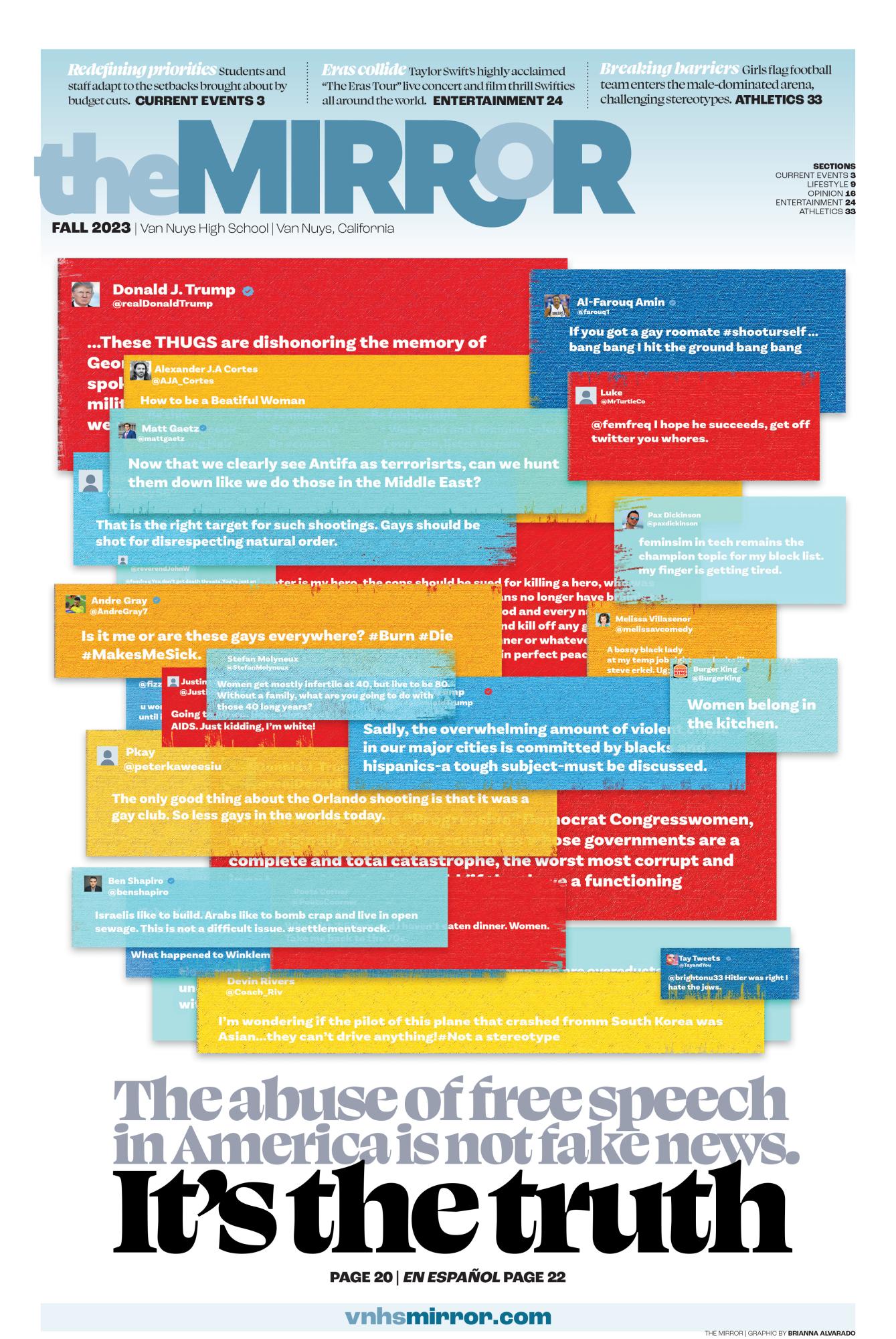By Shayda Shevidi
The Mirror
Editor-in-Chief
“By forcing students to say the pledge of allegiance, it’s a violation of our freedom of speech. I don’t think forcing people to say it in some way makes our country safer.”
NEWS
Should We Be Required to Stand for the Pledge of Allegiance?
Shayda Shevidi
“Congress shall make no law respecting an establishment of religion, or prohibiting the free exercise thereof; or abridging the freedom of speech, or of the press; or the right of the people peaceably to assemble, and to petition the Government for a redress of grievances.”
It’s 7:50 am. The shrill bell rings followed by the wail of the morning announcements.
“Will all walking students please stop for the morning announcements. All students please stand and face the flag. Put your right hand over your heart . Ready, begin. I pledge allegiance to the Flag of the United States of America and to the Republic for which it stands, one nation, under God, indivisible, with liberty and justice for all.”
Most people feel compelled to stand, but they can’t quite bring themselves to explain that urge. In fact, why do we stand for the Pledge of Allegiance?
One student in California refused to. 14-year-old Leilani Thomas of Lower Lake High School sat down during the daily Pledge of Allegiance. Her teacher took notice and docked points off her participation grade.
Thomas is Native American and has not been participating in the Pledge since the second grade. She believes that it is not morally justified for her to stand for a flag that has been the sole reason for the mass genocide of Native Americans.
Thomas felt her free speech rights has been violated and proceeded to record her teacher’s explanation and shared the tape with her school administration.
“Here’s the deal. If you really, really have an argument and feel so strongly about, then I need to see it written out — your argument — in an essay form. Like, why? Why, because here’s the thing; those people, they’re not alive anymore. Your ancestors.”
Konocti School District Superintendent Donna Becnel is standing up for Leilani. Becnel said that Thomas was simply defending her First Amendment rights.
When Thomas was interviewed, she explained, “It’s the reason, because of the history that happened here. On my land. My people’s land. I go by that and I don’t agree with it. So I’m not going to stand for the people who did this to my people.”
The First Amendment declares the protection of several basic liberties — freedom of religion, speech, press, petition, and assembly — and allows for the verbalization of beliefs, allows for the zealous advocation for said beliefs, and allows for the protest of things that are conflict with said beliefs.
It is something that is quite often taken for granted, mostly due to the lack of understanding its significance.
Despite its long history, Freedom of Speech still faces a great deal of controversy, as recent non-violent protests have demonstrated.
Colin Kaepernick , quarterback of the San Francisco 49ers football team, is probably the most famous modern protestor. During the NFL preseason game national anthem, he simply sat while the rest of his team stood.
Kaepernick has willingly immersed himself into harsh controversy to protest what he believes to be wrongdoings against African Americans in the United States. Many critics have called his actions “unamerican” and question his patriotism.
“Once again, I’m not anti-American,” Kaepernick told ESPN. “I love America. I love people. That’s why I’m doing this. I want to help make America better. I think having these conversations helps everybody have a better understanding of where everybody is coming from.”
“I am not going to stand up to show pride in a flag for a country that oppresses black people and people of color,” Kaepernick told NFL Media in an exclusive interview after the game. “To me, this is bigger than football and it would be selfish on my part to look the other way. There are bodies in the street and people getting paid leave and getting away with murder.”
Kaepernick is setting an example for many other football teams all around the nation. In September, a school football team in Beaumont, Texas — comprised of 11- and 12 year olds , all of whom are black— got down on one knee as Beyonce’s “Star Spangled Banner” blared from speakers surround them. The boys on the team all felt like Kaepernick’s protest hit home, especially as young African Americans. They wanted to be a part of it and speak up against the injustices they face. Even their coaches knelt with them. However, they were met with some serious repercussions as their head coach held a season-long suspension in his hands.
“How can you not feel some kind of way about someone on the news getting shot down by police?” one coach said to the Bleacher Report in regards to the September 16 police shooting of Terence Crutcher in Tulsa, Oklahoma. “How can you be so comfortable with injustice that you don’t want to do anything?”
Although it is a time-honored tradition, a firm line must be drawn when it comes to the enforcement of the Pledge of Allegiance. In 1943, the West Virginia State Board of Education vs. Barnette court case ruled that the First Amendment protected students from forcefully pledging to the American flag.
“I don’t believe that students should have to stand for the Pledge,” said Ms. Wanda Moore, a government teacher at Van Nuys High School. “I think that it shows respect, and as a history and government teacher, I think that’s one of its purposes.”
“By forcing students to say the pledge of allegiance, it’s a violation of our freedom of speech. I don’t think forcing people to say it in some way makes our country safer.”

